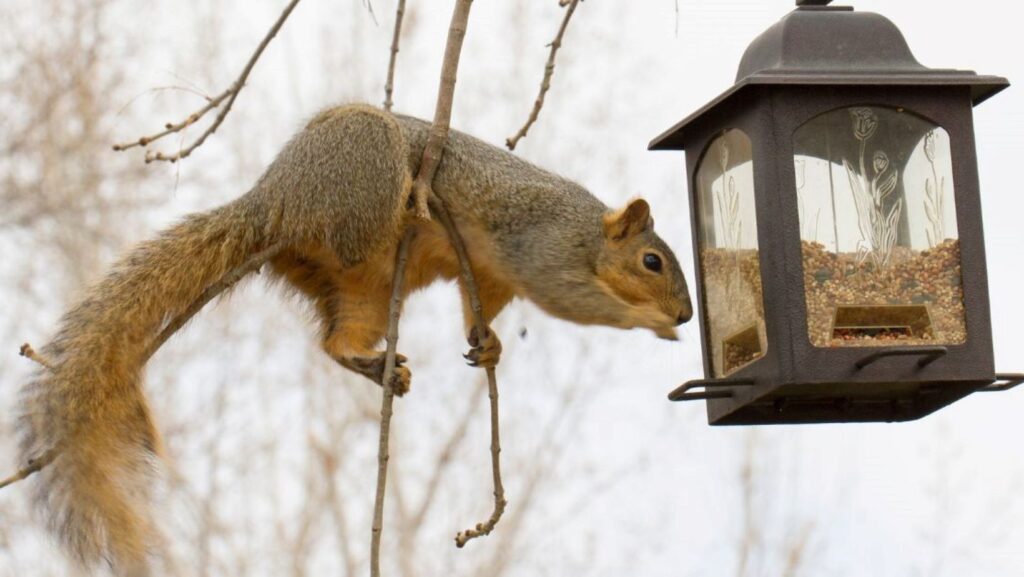Bird feeders can attract a delightful array of birds but often come with an unwelcome visitor: squirrels. Implementing effective squirrel control for bird feeders protects your feed and ensures that your feathered friends can enjoy their meals undisturbed. Many bird lovers struggle with squirrels raiding feeders, and this article will provide practical strategies to manage this issue.
Understanding squirrel behavior is the first step in keeping them away from your feeders. Squirrels are opportunistic foragers drawn in by the scent and availability of food. Adopting certain tactics can minimize their access and maintain a peaceful feeding environment for your birds.
Explore various methods, from squirrel-proof feeders to physical barriers and deterrents that can help safeguard your bird feeding station. Discovering the right approach can enhance your bird watching experience while keeping the squirrels at bay.
Understanding Squirrel Behavior
Squirrels are adept at navigating their environment, making them frequent visitors to bird feeders. Recognizing the factors that draw them to these food sources can help manage their presence effectively.
Factors Attracting Squirrels to Bird Feeders
Several elements make bird feeders appealing to squirrels.
- Food Type is crucial; seeds, especially sunflower and peanuts, are highly attractive to them. Choosing bird feed that contains these ingredients will likely increase squirrel visits.
- Accessibility also plays a significant role. If feeders are easily accessible from nearby branches or structures, squirrels exploit these pathways.
- Feeder Design can either deter or attract them. Open feeders without barriers invite squirrels, while squirrel-proof designs can limit access. By understanding these factors, you can better strategize your squirrel control for bird feeders.
Effective Squirrel Deterrent Strategies
Implementing effective strategies to deter squirrels can protect your bird feeders and the seed within them. The following methods focus on physical barriers, strategic placement, and specialized designs that make it more difficult for squirrels to access bird food.
Mechanical Obstacles and Barriers
Mechanical barriers are one of the most straightforward ways to prevent squirrels from raiding your bird feeders. You can use baffles dome-shaped devices atop or below your feeder, creating a challenging barrier. Here are key barriers to consider:
- Baffles: Install above and below the feeder. A cone-shaped baffle can effectively block squirrels from climbing down or jumping up.
- Poles: Use a smooth pole that squirrels cannot grip. Consider adding a squirrel-proof sleeve to the pole to enhance its efficiency.
- Cages: Encase your feeders in cages with openings that allow birds to feed but keep squirrels out. Ensure the openings are small enough to deter larger critters.
Choosing the Right Bird Feeder Location
The positioning of your bird feeders plays a crucial role in squirrel deterrence. Here are some important considerations:
- Height: Place feeders at least five to six feet off the ground. This height discourages squirrels from jumping from nearby surfaces.
- Distance from Trees: Position feeders at least ten feet away from any trees or structures squirrels can use as launchpads. This distance limits their jumping reach.
- Feeder Accessibility: Ensure that feeders are in open areas where squirrels have little cover. This visibility keeps them exposed and makes them less likely to approach.
Squirrel-Proof Feeder Designs
Investing in squirrel-proof bird feeders is an effective way to keep your feed safe. These feeders have unique features that deter squirrels without affecting birds. Features to look for include:
- Weighted Bottoms: These feeders have mechanisms that close access when a heavier animal stands on them.
- Spring-Loaded Ports: When a squirrel attempts to eat, these ports automatically shut, allowing only small birds to access the food inside.
- Enclosed Feeders: Some designs completely enclose the seed compartment, allowing only certain birds to reach the food.
Combining these strategies can significantly reduce squirrel interference with your bird feeders.
Preventive Measures and Feeding Tactics
Focusing on feeder placement and alternative feeding strategies is essential to effectively managing squirrels while enjoying birdwatching. These methods minimize squirrel access while ensuring birds benefit from your feeding efforts.
Feeder Placement and Protection
Positioning your bird feeders strategically can significantly reduce squirrel interference. Select locations at least 10-12 feet from trees, fences, or buildings, as these provide jumping points for squirrels.
Consider using baffles, which can be installed above or below feeders to block squirrel access. Many bird feeders now come equipped with squirrel-proof designs that utilize innovative mechanisms to deter these pests effectively. Opt for metal feeders rather than plastic, as they are more durable against squirrel chewing.
In urban areas like Dallas, look for feeders specifically advertised as squirrel-resistant. Regularly check your feeder for any signs of attempted squirrel access and adjust its location or protective measures as needed.
Alternative Feeding Strategies
Implementing alternative feeding strategies can help you cater to birds while managing squirrels. One effective method is to use squirrel-proof feedersthat feature weight-activated mechanisms. These feeders close off access when a squirrel tries to feed, allowing only birds to enjoy the seeds.
Another technique is to offer food in a specific spot away from the bird feeders to divert squirrels. This can include placing a platform feeder with squirrel-friendly food, like corn or peanuts, at a distance.
You might also consider using bird seed mixes less appealing to squirrels, such as those containing safflower seeds. These strategies can foster a peaceful coexistence between birds and squirrels. If you face persistent challenges, reach out to Critter Stop at (214) 234-2616. Their expertise in humane wildlife removal has earned them fantastic customer reviews for high-quality service you can trust.



